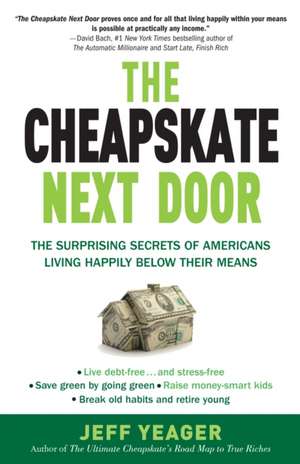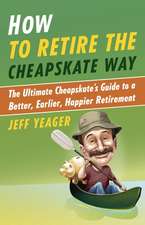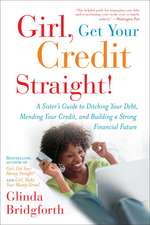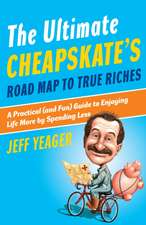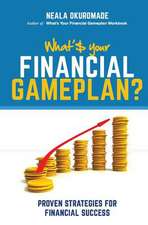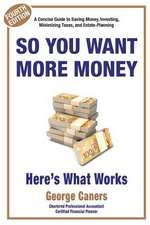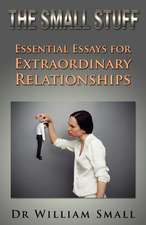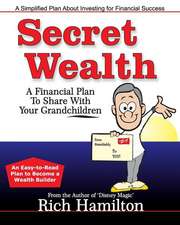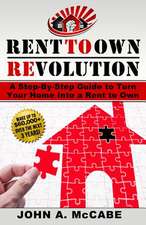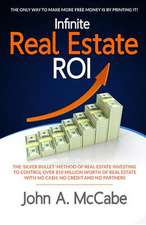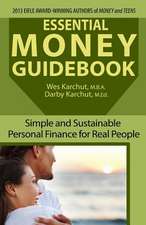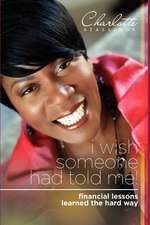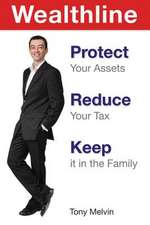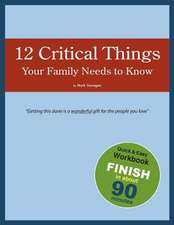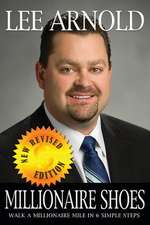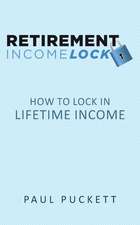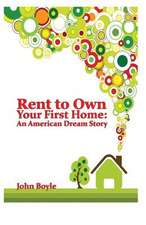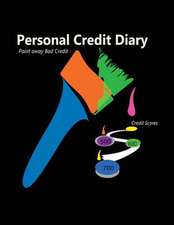The Cheapskate Next Door: The Surprising Secrets of Americans Living Happily Below Their Means
Autor Jeff Yeageren Limba Engleză Paperback – 31 mai 2010
Jeff reveals the 16 key attitudes about money – and life – that allow the cheapskates next door to live happy, comfortable, debt-free lives while spending only a fraction of what most Americans spend. Their strategies will change your way of thinking about money and debunk some of life’s biggest money myths. For example, you’ll learn: how to cut your food bill in half and eat healthier as a result; how your kids can get a college education without ever borrowing a dime; how to let the other guy pay for deprecation by learning the secrets of buying used, not abused; how you can save serious money by negotiating and bartering; and how – if you know where to look – there’s free stuff and free fun all around you.
The Cheapskate Next Door also features dozens of original “Cheap Shots” – quick, money saving tips that could save you more than $25,000 in a single year! Cheap Shots give you the inside scoop on:
• How to save hundreds on kids’ toys;
• What inexpensive old-fashioned kitchen appliance can save you more than $200 a year;
• How you can travel the world without ever having to pay for lodging;
• What single driving tip can save you $30,000 during your lifetime;
• Even how to save up to 40% on fine wines (and we’re not talking about the kind that comes in a box).
From simple money saving tips to truly life changing financial strategies, the cheapskates next door know that the key to financial freedom and enjoying life more is not how much you earn, but how much you spend.
Jeff Yeager is the author of The Ultimate Cheapskate’s Road Map to True Riches, and has appeared as a guest correspondent on the NBC Today Show and Discovery’s Planet Green network. He is also the author of the popular blog The Green Cheapskate, www.TheDailyGreen.com
Visit his website www.UltimateCheapskate.com
Preț: 105.82 lei
Nou
Puncte Express: 159
Preț estimativ în valută:
20.25€ • 21.14$ • 16.76£
20.25€ • 21.14$ • 16.76£
Carte disponibilă
Livrare economică 14-28 martie
Preluare comenzi: 021 569.72.76
Specificații
ISBN-13: 9780767931328
ISBN-10: 0767931327
Pagini: 231
Dimensiuni: 135 x 202 x 17 mm
Greutate: 0.21 kg
Editura: BROADWAY BOOKS
ISBN-10: 0767931327
Pagini: 231
Dimensiuni: 135 x 202 x 17 mm
Greutate: 0.21 kg
Editura: BROADWAY BOOKS
Notă biografică
Jeff Yeager is the author of The Ultimate Cheapskate’s Road Map to True Riches, and has appeared as a guest correspondent on the NBC Today Show and Discovery’s Planet Green network. He is also the author of the popular blog The Green Cheapskate, www.TheDailyGreen.com
Visit his website www.UltimateCheapskate.com
Visit his website www.UltimateCheapskate.com
Extras
Chapter 1
The Phrenology of Frugality:
16 Idiosyncrasies of the Cheapskate Mind
The statistics on sanity are that one out of every four
Americans is suffering from some form of mental
illness. Think of your three best friends. If they
are okay, then it's you.
-Rita Mae Brown
Are you saying that people will be happier if they shop less?" Judging from the way she was sneering at me across the faux-news desk, it was clear that the local noonday TV anchorwoman wasn't asking a rhetorical question. She looked like she'd bought-and was wearing-one of everything that QVC was selling that day. And her clothes clearly weren't all she'd bought. Her extensive cosmetic surgery reminded me of a roadside billboard I once saw for a plastic surgeon just across the border in Mexico: "U Pay 4 UR Face + Hips?. . . I do UR Breasts 4 Free!"
I'd endeared myself to her earlier by arriving for the interview on my bicycle, in a sweat-stained T-shirt. Suffice it to say that we came from different worlds.
"But shopping is what we do. Shopping is what makes us happy. Are you crazy?" she said, looking at me like I must have been hitting the box wine in the green room before the interview.
Well, the cheapskate's brain is definitely wired differently, of that I'm convinced. You don't need to spend much time around us or be trained as a psychiatrist (or local news anchor) to figure that out. Whether we're born that way or we pick up certain attitudes and beliefs about life as we go along, the cheapskate next door sees the world a bit differently than most folks.
Here's a brief tour of the cheapskate mindset-a synopsis of the sixteen key synapses that set the cheapskate next door apart from the typical American consumer.
1. The Joneses Can Kiss Our Assets
"Welcome to the Taj Mahovel!" Jacquie Phelan greeted me with a big smile and friendly hug on the doorstep of the eclectic house in Fairfax, California, where she's lived with her husband, Charlie, for the past twenty-six years.
As I'd driven down their street, I had trouble spotting addresses on the immaculately maintained, über-yuppiefied, overly remodeled houses that lined the pleasant lane. But when I saw the warren of little outbuildings strung together by pergolas constructed of every type of salvaged material imaginable, I knew I'd arrived at Jacquie's house. This was clearly the house of someone who wasn't concerned about what the Joneses think. This house had to belong to a cheapskate.
"A few years ago we heard a realtor walking past our house with some prospective buyers, and they were talking about how tacky some of the homes on the street are," Jacquie told me as we sat having lunch under a lean-to made of scrap lumber (aka "The Habitat") in their jungly side yard. "And I piped back to the real estate agent from inside the Habitat, 'It's going to stay that way, too!' "
My lunch with Jacquie and Charlie, by the way, was chicken soup and a truly tasty array of little finger foods, most of which
my Freegan hostess told me she'd salvaged the previous evening from dumpsters behind area markets. "Hmm?. . . ?trash-can tapas," I thought to myself. "There's a first time for everything." (Among other journalistic enterprises, Jacquie writes about her unique approach to food and cooking on her blog, "Salivation Army," at phelanfood.wordpress.com.)
Don't get me wrong: Jacquie and Charlie's house isn't a public hazard or anything like that. In fact, it's kind of cool and rather pretty in its own Hobbit-treehouse-ish way. It's just that it's a house designed to please the people who live in it, and not necessarily the people who live next door to it. According to Jacquie, it's also the couple's personal attempt to help "stem the seemingly inevitable shift of the neighborhood from a cozy place, filled with humble homes" into one of "investment (properties) for upwardly mobile but of course deeply-in- debt people" who have no time to become part of the community-and no intention of staying there once they can afford to move on and gentrify the next modest-but-content neighborhood.
Will Rogers once said, "Too many people spend money they haven't earned, to buy things they don't want, to impress people they don't like." Well, he wasn't talking about the cheapskates next door.
When asked the question "On a scale of one to ten, with one being not important at all and ten extremely important, how concerned are you about 'keeping up with the Joneses' (i.e., maintaining economic status/ appearances with your peers)?" roughly 85 percent of cheapskates ranked it as "one," not important at all. (Incidentally, of the remaining 15 percent of respondents, more than half took the liberty of going off the chart and rating it as a "zero" or even less!)
Because of the cheapskates' strong sense of self-worth, they rarely covet the lifestyle or material possessions of others, and have little desire to try to impress other people or keep up appearances. Dylan Davis, of Twinsburg, Ohio, wrote: "We make more money than almost everyone we know, but spend less than all of our peers?. . . neither of us cares what other people think about us."
That's not to say that cheapskates are always immune to peer pressure. And luckily, there are things you can do to ward off the big green monster when he does come calling.
Gerald Thomson told me about a time when his wife, Julia, came home from work feeling a little envious of the big homes some of her coworkers were buying. "She sat down at the computer and submitted our financial information to see how much of a mortgage we could qualify for. Once she saw that we could qualify to purchase a larger home, she felt better. As long as she knew we could keep up with the Joneses, but choose not to, she was able to keep focused on our early retirement goals."
2. A Cheapskate Values Time More than Money
In my conversations with the cheapskates next door, I was struck by how often they spoke about the value and cost of things not in terms of dollars and cents, but rather days and hours. It's like cheapskates have their own currency. They automatically convert the price of things into the currency of time-their own time.
We've always heard that "time is money." Cheapskates tend to reverse that axiom, making it "money is time." A new pair of boots might cost $150, but for Clara, the cheapskate who makes $32,000 a year, those boots cost close to two days of her time spent working in a job that she doesn't really enjoy. When Clara looks at it in those terms and considers what else she might do with that time and that money, she decides that her old boots will do just fine.
The idea of translating money into the cost of your time was popularized-and maybe pioneered-by Vicki Robin and the late Joe Dominguez in their bestselling book Your Money or Your Life (Penguin Books, reissued in 2008). The authors present various formulas and exercises to help readers determine the true value of their time-or "life energy," in the authors' words-and evaluate whether you're really getting the most value out of the limited time we all have here on Earth. This classic book is credited by many cheapskates, myself included, with fundamentally reshaping their attitude toward money and life, and it was one of the most frequently recommended reference books by those responding to my questionnaire.
It's not unusual to encounter cheapskates who actually carry around a card in their wallets or purses with a homemade conversion chart on it, showing how much they earn in their jobs by the minute, hour, day, week, and so on. "It helps to put the true cost
of things in perspective," one card-carrying cheapskate told me. "When I think of the joy I get out of having a day off with my kids, or reading, or relaxing, or whatever?. . . stuff and the cost it represents in terms of my time quickly loses its appeal. It just becomes too expensive."
The cheapskate next door also recognizes that, if you go about it wrong, frugality and saving money can be a time-suck in its own right. If instead of buying that $150 pair of new boots in the department store, Clara spends two days combing yard sales and thrift stores across the city to find a used pair for only $20, then in terms of time-value she'd have been better off just buying the new pair.
That's why the cheapskate next door is a "premeditated shopper" and not a "bargain hunter," as I'll discuss in a minute. That's also why they use things up, wear things out, make things last, and, sometimes, simply do without. For the cheapskate next door, it's really more about stretching their time than it is about stretching their dollars.
3. A Cheapskate Values Value
"Frank's the kind of guy who knows the price of everything, but the value of nothing."
My friend Carol Martina has a knack for zingers, many of them directed toward Frank, her husband of forty years and a retired U.S. government accountant. "Frank's so tight, he squeaks when he walks. When he opens up his wallet, Washington and Lincoln squint from the shock of seeing daylight."
I like Carol and Frank a lot. While Frank may indeed be tight with a buck, if Carol is correct about him "knowing the price of everything but the value of nothing," then he really doesn't fit the profile of the typical cheapskate next door. Sorry, Frank. But keep trying.
In response to the questions I asked about which factors influence cheapskates most when they consider whether or not to buy a product, surprisingly "price" was not the top choice. "Quality/durability" was ranked as the number-one consideration, with about 95 percent of cheapskates ranking "quality/durability" and "price" as the top two considerations, in many cases ranking them both as equally important. As Warren Buffet once said, "Whether we're talking about socks or stocks, I like buying quality merchandise when it is marked down."
Coming in third was "something that will increase/maintain value," which I'll also discuss in a minute. Trailing far behind those top three were a variety of other factors, including a "healthy choice," "eco-friendly," "hand/locally made vs. mass produced," "country where made," and, in last place, "brand."
It's clear from the questionnaires and comments I received that for the cheapskate next door, "value" is defined as Durability/
Quality Divided by Price, or D4D (Durability for Dollars), as I sometimes call it. This is reflective of the cheapskate's desire to own things that are going to last a very long time, and that perform well over the long haul without requiring expensive repairs or becoming functionally obsolete.
On this point, some of the cheapskates I've met kind of freaked me out, in a Rain Man sort of way. It's like they had an amortization calculator implanted in their brains. Rob Crabtree, for example, could instantly tell you whether one item-from a new car to a new pair of underwear-was a better value than another, based on the price and projected lifespan of each.
"When you don't live in a throwaway world-or at least you've made your own little world where you don't throw things away-then you need to do the math and figure out how much something costs based on how long it's going to last, not based on how long you're going to keep it before you throw it away," Rob told me.
(Hint from Rob "Rain Man" Crabtree: Go with boxers, even if they cost up to 20 percent more than briefs. Gotta factor in the increased risk of premature elastic failure with briefs, don't you know.)
4. Shopping Isn't a Cheapskate Sport
When people discover that I'm a cheapskate, I'm surprised at how often they say something like, "I just don't have all that time to shop for bargains." There's a common perception-a misperception, in my experience-that "cheapskate" is synonymous with "bargain hunter."
Don't get me wrong, we cheapskates like to get the best possible value for our money. So yeah, when we shop, we do our best to scope out bargains. But the difference between a cheapskate and a bargain hunter is that cheapskates generally don't like to shop. Cheapskates spend and consume less in large part because we take little or no joy in shopping-so we simply shop less-in contrast to most true bargain hunters I know.
Anecdotally, nearly all of the cheapskates I personally interviewed while writing this book made it clear that they don't view shopping as "recreation," "sport," or "therapy," as they often put it. That's not to say that they don't boast about what a good deal they got on this purchase, or how much they saved on that deal, because they frequently do (trust me). But in the case of the cheapskate next door, that's the result of being a smart but reluctant shopper, not a bargain hunter or hyper-consumer.
A number of studies and personal experiments over the years have supported the fact that the more time people spend shopping, the more they tend to buy and the more they tend to spend. As Gomer Pyle used to say, "Surprise, surprise, surprise."
As we'll see in Chapter 11, nearly 90 percent of the cheapskates I polled say they shop for groceries only once every week, if that often. That's in sharp contrast to the almost 50 percent of Americans who say they shop for groceries three or four times every week. And when asked how often they shop for clothing, a majority of cheapskates I polled responded twice per year or even less frequently.
Another rather surprising case in point: About 75 percent of those cheapskates polled say that they rarely or never shop at garage/yard sales, auctions, or rummage sales, often mentioning that such shopping venues encourage people to buy things they don't really need.
"I've never understood why people like to shop," cheapskate Janice Rogers told me. "To me it's a chore. Hell, I have more fun doing the laundry than going shopping. I guess [shopping's] like alcohol or drugs?. . . some people are addicted to it, and to other people it's nothing."
According to the cheapskate next door, the best way to win at the sport of shopping is to simply refuse to take the field.
5. A Cheapskate Regrets Nothing
I've been waiting on the World Health Organization to issue a Pandemic Alert. It's clear to me that here in America we're in the midst of an epidemic of buyer's remorse. Maybe it hasn't spread globally yet, so that's why the WHO is holding off on the alert.
I recently heard a report on the NBC Nightly News claiming that Americans express at least "some regrets" about 80 percent of the discretionary items they buy, within one year of having made the purchase. In fairness, that's not saying that they "entirely regret" the purchase or that they'd choose otherwise if they had it to do over again. And that's just their level of regret within the first year of purchasing an item; I assume that the ICKM4BT (I-Could-Kick-Myself-For- Buying-That) Level steadily increases with time.
While I continue to work tirelessly in the Ultimate Cheapskate Lab to develop a vaccine to prevent buyer's remorse, results may be many years away. But there's encouraging news for all those who suffer from ICKM4BT: I've discovered that the cheapskate next door is naturally immune. Some type of anti-buying antibody, I assume.
In response to the question "On a scale of one to ten, with one being never and ten being all of the time, how frequently do you buy an item that you eventually regret buying (aka 'buyer's remorse') or that disappoints you?," more than 90 percent of cheapskates responded "one" (never). A pretty stark contrast to the NBC News report, wouldn't you say?
Evelyn "Bible Babe" Edgett confessed that she's somewhat more susceptible to buyer's remorse than most cheapskates (she rated herself a "three"), but told me, "When I do feel that I have been ripped off, there's hell to pay for the guy who did it. I almost always get my money back or a better product." Evelyn is a homesteader way back in the hills of eastern Oklahoma. She cuts her own firewood and slaughters her own hogs, so if you work at one of the stores where she shops, you might want to be careful.
The Phrenology of Frugality:
16 Idiosyncrasies of the Cheapskate Mind
The statistics on sanity are that one out of every four
Americans is suffering from some form of mental
illness. Think of your three best friends. If they
are okay, then it's you.
-Rita Mae Brown
Are you saying that people will be happier if they shop less?" Judging from the way she was sneering at me across the faux-news desk, it was clear that the local noonday TV anchorwoman wasn't asking a rhetorical question. She looked like she'd bought-and was wearing-one of everything that QVC was selling that day. And her clothes clearly weren't all she'd bought. Her extensive cosmetic surgery reminded me of a roadside billboard I once saw for a plastic surgeon just across the border in Mexico: "U Pay 4 UR Face + Hips?. . . I do UR Breasts 4 Free!"
I'd endeared myself to her earlier by arriving for the interview on my bicycle, in a sweat-stained T-shirt. Suffice it to say that we came from different worlds.
"But shopping is what we do. Shopping is what makes us happy. Are you crazy?" she said, looking at me like I must have been hitting the box wine in the green room before the interview.
Well, the cheapskate's brain is definitely wired differently, of that I'm convinced. You don't need to spend much time around us or be trained as a psychiatrist (or local news anchor) to figure that out. Whether we're born that way or we pick up certain attitudes and beliefs about life as we go along, the cheapskate next door sees the world a bit differently than most folks.
Here's a brief tour of the cheapskate mindset-a synopsis of the sixteen key synapses that set the cheapskate next door apart from the typical American consumer.
1. The Joneses Can Kiss Our Assets
"Welcome to the Taj Mahovel!" Jacquie Phelan greeted me with a big smile and friendly hug on the doorstep of the eclectic house in Fairfax, California, where she's lived with her husband, Charlie, for the past twenty-six years.
As I'd driven down their street, I had trouble spotting addresses on the immaculately maintained, über-yuppiefied, overly remodeled houses that lined the pleasant lane. But when I saw the warren of little outbuildings strung together by pergolas constructed of every type of salvaged material imaginable, I knew I'd arrived at Jacquie's house. This was clearly the house of someone who wasn't concerned about what the Joneses think. This house had to belong to a cheapskate.
"A few years ago we heard a realtor walking past our house with some prospective buyers, and they were talking about how tacky some of the homes on the street are," Jacquie told me as we sat having lunch under a lean-to made of scrap lumber (aka "The Habitat") in their jungly side yard. "And I piped back to the real estate agent from inside the Habitat, 'It's going to stay that way, too!' "
My lunch with Jacquie and Charlie, by the way, was chicken soup and a truly tasty array of little finger foods, most of which
my Freegan hostess told me she'd salvaged the previous evening from dumpsters behind area markets. "Hmm?. . . ?trash-can tapas," I thought to myself. "There's a first time for everything." (Among other journalistic enterprises, Jacquie writes about her unique approach to food and cooking on her blog, "Salivation Army," at phelanfood.wordpress.com.)
Don't get me wrong: Jacquie and Charlie's house isn't a public hazard or anything like that. In fact, it's kind of cool and rather pretty in its own Hobbit-treehouse-ish way. It's just that it's a house designed to please the people who live in it, and not necessarily the people who live next door to it. According to Jacquie, it's also the couple's personal attempt to help "stem the seemingly inevitable shift of the neighborhood from a cozy place, filled with humble homes" into one of "investment (properties) for upwardly mobile but of course deeply-in- debt people" who have no time to become part of the community-and no intention of staying there once they can afford to move on and gentrify the next modest-but-content neighborhood.
Will Rogers once said, "Too many people spend money they haven't earned, to buy things they don't want, to impress people they don't like." Well, he wasn't talking about the cheapskates next door.
When asked the question "On a scale of one to ten, with one being not important at all and ten extremely important, how concerned are you about 'keeping up with the Joneses' (i.e., maintaining economic status/ appearances with your peers)?" roughly 85 percent of cheapskates ranked it as "one," not important at all. (Incidentally, of the remaining 15 percent of respondents, more than half took the liberty of going off the chart and rating it as a "zero" or even less!)
Because of the cheapskates' strong sense of self-worth, they rarely covet the lifestyle or material possessions of others, and have little desire to try to impress other people or keep up appearances. Dylan Davis, of Twinsburg, Ohio, wrote: "We make more money than almost everyone we know, but spend less than all of our peers?. . . neither of us cares what other people think about us."
That's not to say that cheapskates are always immune to peer pressure. And luckily, there are things you can do to ward off the big green monster when he does come calling.
Gerald Thomson told me about a time when his wife, Julia, came home from work feeling a little envious of the big homes some of her coworkers were buying. "She sat down at the computer and submitted our financial information to see how much of a mortgage we could qualify for. Once she saw that we could qualify to purchase a larger home, she felt better. As long as she knew we could keep up with the Joneses, but choose not to, she was able to keep focused on our early retirement goals."
2. A Cheapskate Values Time More than Money
In my conversations with the cheapskates next door, I was struck by how often they spoke about the value and cost of things not in terms of dollars and cents, but rather days and hours. It's like cheapskates have their own currency. They automatically convert the price of things into the currency of time-their own time.
We've always heard that "time is money." Cheapskates tend to reverse that axiom, making it "money is time." A new pair of boots might cost $150, but for Clara, the cheapskate who makes $32,000 a year, those boots cost close to two days of her time spent working in a job that she doesn't really enjoy. When Clara looks at it in those terms and considers what else she might do with that time and that money, she decides that her old boots will do just fine.
The idea of translating money into the cost of your time was popularized-and maybe pioneered-by Vicki Robin and the late Joe Dominguez in their bestselling book Your Money or Your Life (Penguin Books, reissued in 2008). The authors present various formulas and exercises to help readers determine the true value of their time-or "life energy," in the authors' words-and evaluate whether you're really getting the most value out of the limited time we all have here on Earth. This classic book is credited by many cheapskates, myself included, with fundamentally reshaping their attitude toward money and life, and it was one of the most frequently recommended reference books by those responding to my questionnaire.
It's not unusual to encounter cheapskates who actually carry around a card in their wallets or purses with a homemade conversion chart on it, showing how much they earn in their jobs by the minute, hour, day, week, and so on. "It helps to put the true cost
of things in perspective," one card-carrying cheapskate told me. "When I think of the joy I get out of having a day off with my kids, or reading, or relaxing, or whatever?. . . stuff and the cost it represents in terms of my time quickly loses its appeal. It just becomes too expensive."
The cheapskate next door also recognizes that, if you go about it wrong, frugality and saving money can be a time-suck in its own right. If instead of buying that $150 pair of new boots in the department store, Clara spends two days combing yard sales and thrift stores across the city to find a used pair for only $20, then in terms of time-value she'd have been better off just buying the new pair.
That's why the cheapskate next door is a "premeditated shopper" and not a "bargain hunter," as I'll discuss in a minute. That's also why they use things up, wear things out, make things last, and, sometimes, simply do without. For the cheapskate next door, it's really more about stretching their time than it is about stretching their dollars.
3. A Cheapskate Values Value
"Frank's the kind of guy who knows the price of everything, but the value of nothing."
My friend Carol Martina has a knack for zingers, many of them directed toward Frank, her husband of forty years and a retired U.S. government accountant. "Frank's so tight, he squeaks when he walks. When he opens up his wallet, Washington and Lincoln squint from the shock of seeing daylight."
I like Carol and Frank a lot. While Frank may indeed be tight with a buck, if Carol is correct about him "knowing the price of everything but the value of nothing," then he really doesn't fit the profile of the typical cheapskate next door. Sorry, Frank. But keep trying.
In response to the questions I asked about which factors influence cheapskates most when they consider whether or not to buy a product, surprisingly "price" was not the top choice. "Quality/durability" was ranked as the number-one consideration, with about 95 percent of cheapskates ranking "quality/durability" and "price" as the top two considerations, in many cases ranking them both as equally important. As Warren Buffet once said, "Whether we're talking about socks or stocks, I like buying quality merchandise when it is marked down."
Coming in third was "something that will increase/maintain value," which I'll also discuss in a minute. Trailing far behind those top three were a variety of other factors, including a "healthy choice," "eco-friendly," "hand/locally made vs. mass produced," "country where made," and, in last place, "brand."
It's clear from the questionnaires and comments I received that for the cheapskate next door, "value" is defined as Durability/
Quality Divided by Price, or D4D (Durability for Dollars), as I sometimes call it. This is reflective of the cheapskate's desire to own things that are going to last a very long time, and that perform well over the long haul without requiring expensive repairs or becoming functionally obsolete.
On this point, some of the cheapskates I've met kind of freaked me out, in a Rain Man sort of way. It's like they had an amortization calculator implanted in their brains. Rob Crabtree, for example, could instantly tell you whether one item-from a new car to a new pair of underwear-was a better value than another, based on the price and projected lifespan of each.
"When you don't live in a throwaway world-or at least you've made your own little world where you don't throw things away-then you need to do the math and figure out how much something costs based on how long it's going to last, not based on how long you're going to keep it before you throw it away," Rob told me.
(Hint from Rob "Rain Man" Crabtree: Go with boxers, even if they cost up to 20 percent more than briefs. Gotta factor in the increased risk of premature elastic failure with briefs, don't you know.)
4. Shopping Isn't a Cheapskate Sport
When people discover that I'm a cheapskate, I'm surprised at how often they say something like, "I just don't have all that time to shop for bargains." There's a common perception-a misperception, in my experience-that "cheapskate" is synonymous with "bargain hunter."
Don't get me wrong, we cheapskates like to get the best possible value for our money. So yeah, when we shop, we do our best to scope out bargains. But the difference between a cheapskate and a bargain hunter is that cheapskates generally don't like to shop. Cheapskates spend and consume less in large part because we take little or no joy in shopping-so we simply shop less-in contrast to most true bargain hunters I know.
Anecdotally, nearly all of the cheapskates I personally interviewed while writing this book made it clear that they don't view shopping as "recreation," "sport," or "therapy," as they often put it. That's not to say that they don't boast about what a good deal they got on this purchase, or how much they saved on that deal, because they frequently do (trust me). But in the case of the cheapskate next door, that's the result of being a smart but reluctant shopper, not a bargain hunter or hyper-consumer.
A number of studies and personal experiments over the years have supported the fact that the more time people spend shopping, the more they tend to buy and the more they tend to spend. As Gomer Pyle used to say, "Surprise, surprise, surprise."
As we'll see in Chapter 11, nearly 90 percent of the cheapskates I polled say they shop for groceries only once every week, if that often. That's in sharp contrast to the almost 50 percent of Americans who say they shop for groceries three or four times every week. And when asked how often they shop for clothing, a majority of cheapskates I polled responded twice per year or even less frequently.
Another rather surprising case in point: About 75 percent of those cheapskates polled say that they rarely or never shop at garage/yard sales, auctions, or rummage sales, often mentioning that such shopping venues encourage people to buy things they don't really need.
"I've never understood why people like to shop," cheapskate Janice Rogers told me. "To me it's a chore. Hell, I have more fun doing the laundry than going shopping. I guess [shopping's] like alcohol or drugs?. . . some people are addicted to it, and to other people it's nothing."
According to the cheapskate next door, the best way to win at the sport of shopping is to simply refuse to take the field.
5. A Cheapskate Regrets Nothing
I've been waiting on the World Health Organization to issue a Pandemic Alert. It's clear to me that here in America we're in the midst of an epidemic of buyer's remorse. Maybe it hasn't spread globally yet, so that's why the WHO is holding off on the alert.
I recently heard a report on the NBC Nightly News claiming that Americans express at least "some regrets" about 80 percent of the discretionary items they buy, within one year of having made the purchase. In fairness, that's not saying that they "entirely regret" the purchase or that they'd choose otherwise if they had it to do over again. And that's just their level of regret within the first year of purchasing an item; I assume that the ICKM4BT (I-Could-Kick-Myself-For- Buying-That) Level steadily increases with time.
While I continue to work tirelessly in the Ultimate Cheapskate Lab to develop a vaccine to prevent buyer's remorse, results may be many years away. But there's encouraging news for all those who suffer from ICKM4BT: I've discovered that the cheapskate next door is naturally immune. Some type of anti-buying antibody, I assume.
In response to the question "On a scale of one to ten, with one being never and ten being all of the time, how frequently do you buy an item that you eventually regret buying (aka 'buyer's remorse') or that disappoints you?," more than 90 percent of cheapskates responded "one" (never). A pretty stark contrast to the NBC News report, wouldn't you say?
Evelyn "Bible Babe" Edgett confessed that she's somewhat more susceptible to buyer's remorse than most cheapskates (she rated herself a "three"), but told me, "When I do feel that I have been ripped off, there's hell to pay for the guy who did it. I almost always get my money back or a better product." Evelyn is a homesteader way back in the hills of eastern Oklahoma. She cuts her own firewood and slaughters her own hogs, so if you work at one of the stores where she shops, you might want to be careful.
Recenzii
Reading THE CHEAPSKATE NEXT DOOR is like looking in the mirror on a very good hair day - I see myself and I like what I see. the mirror, of course, is the passel of stories Jeff serves up with good humor about cheapskates like me from around the country. I see myself in almost every one of his 16 Idiosyncrasies of the Cheapskate Mind. I've dump picked, cherry picked yard sales, carefully picked every purchase, always for a fraction of retail. Like my Cheapskate clan, I'm a bit smug about it all - feeling smart rather than deprived - especially in this recession that has barely affected my financial peace of mind. Jeff is the consummate troubadour for our clan. If you don't save 10 times the amount you spend on this book, you probably didn't read it.” – Vicki Robin, author of Your Money or Your Life
"I loved this book and couldn't put it down, it is an absolute must-read. Jeff puts the fun back in frugality with entertaining insights from "cheapskates" all over the country, sharing their secrets on how to live happy, less-stressful lives on the cheap…I think everyone in the country should read this book." --Stephanie Nelson, founder www.CouponMom.com and author of "The Coupon Mom's Guide to Cutting Your Grocery Bills in Half”
“Jeff Yeager has a way of unleashing the inner cheapskate in us all!” – Jean Chatzky
“I’ve written that there are three basic ways to finish rich: spend less, make more, save more. Jeff Yeager has discovered a whole class of happy Americans who pride themselves on mastering the ‘spend less’ part of the equation. The Cheapskate Next Door proves once and for all that living happily within your means is possible at practically any income.” -- David Bach #1 New York Times Bestselling author of The Automatic Millionaire and Start Late, Finish Rich
“Jeff Yeager's research and cross-country cheapskate quest uncovered a truth few Americans know: Not only can you be happy buying less stuff, you would likely be happier. Who are these people who opt out of the consuming rat race? They are The Cheapskate Next Door. For them, spending less is not about deprivation; it's about liberation. And Yeager will tell you all about them -- and their secrets -- in his usual conversational and humorous style.
A must-read for those who want to jump off the consumer treadmill and discover what's really important.” --Gregory Karp, syndicated newspaper columnist and author of Living Rich by Spending Smart and The 1-2-3 Money Plan
"Whether you are a born penny pincher or merely cheapskate-curious, you're bound to learn something from the Cheapskate Next Door." -- USA Today
“The Cheapskate Next Door” by Jeff Yeager, suggests that the simplest solution is to live substantially below your means. Let’s deal with Mr. Yeager’s book first, because it is the better of the two. One reason is that Mr. Yeager, a former executive with a nonprofit association who now writes about saving money and runs Ultimatecheapskate.com, is so amusing.
Here’s one quick example: Conceding that he may have taken the idea of skimping on new clothing too far, Mr. Yeager tells what he says is a true story about arriving early for a book signing to which he had traveled by bicycle. (Driving costs you money in gasoline and depreciation.)
“I was dressed as I usually am when I am cycling, in ratty-looking shorts and a faded T-shirt,” from a 1978 rock concert, as it turns out, he says. “I decided to take a few moments to relax before the signing, so I sat down on a park bench outside the bookstore with my trusty but tattered 10-speed” next to him.
“A nicely dressed older woman walked up to me, opened her purse and tried to hand me a $10 bill, saying, ‘You poor man, you look you could use some help.’ ”
Mr. Yeager was at that book signing promoting his previous book, “The Ultimate Cheapskate’s Road Map to True Riches.” In that one, he offered his personal money-saving tips like these: Never spend more than $1 a pound for meat at the supermarket — advice that leads him to eat such things as beef hearts and kidneys — and always rummage around in couch cushions at hotels for loose change. (“Those things are like upholstered A.T.M.’s.”)
This time around, he talks to his fellow cheapskates, a moniker they wear with pride, about their money-saving ideas. Many of their tips are clever twists on the conventional.
For example, cheapskates always refinance their homes — when it makes sense. First, they make sure the length of the new mortgage is less than the years remaining on the old one. If they have 19 years to go on their old mortgage, for example, they get a 15-year mortgage when they refinance. That way, they will own the house free and clear four years earlier. And it goes without saying that they buy substantially less house than they can afford. Not only is the purchase price less, but so are the taxes and the upkeep.
But some of the suggestions are unsettling. Mr. Yeager introduces us to people who don’t think twice about grabbing uneaten food off the adjacent restaurant table, once those diners have paid their check, and people who find nothing wrong with “Dumpster diving” for food that supermarkets have thrown away.
Mr. Yeager doesn’t judge. He uses all the examples to support his “heartfelt belief that most Americans would be happier, and the quality of their lives would actually increase, if they would spend and consume less.” -- New York Times
"Ah, yes, belt-tightening is the procedure of the day, from how giant businesses conduct themselves to
managing one’s own personal finances. It is the latter aspect of conservative spending that the author of
the popular Ultimate Cheapskate’s Road Map to True Riches (2007) and of the blog Green Cheapskate
addresses in this delightful—yes, delightful—guide for me, you, and everyone else. Personal finance is a
universal concern, particularly in these tight economic times. It is a topic that people need to know about
but still shy away from. Yeager is here to draw you in and does so easily. He does not use the term
“cheapskate” in a pejorative fashion; after all, he lists himself as one and wishes that all his readers would
aspire to cheapskateness. A cheapskate to him is someone who lives below his or her means and does so
happily. How to spend less than you are spending now is the program he details; the amazing fact about
this book is that in addition to his instructions making perfect sense, like no other book of its kind, this one
can be read simply for the humor of the author’s prose." -- Booklist, starred review
"...Jeff Yeager, the author of The Cheapskate Next Door: The Surprising Secrets of Americans Living Happily Below Their Means (Broadway), doesn’t care how he looks, and wants his book to bring out everyone’s “inner miser.” Believing that “money really has very little to do with true happiness,” he traveled across the country to meet likeminded skinflints, a journey he tracked on his blog, the Green Cheapskate. Everywhere he found contented families who prospered on small incomes. Parsimonious parents — loving but never lavish — let their kids know early on that they’d be paying their own way through college. Others made paper from dryer lint or stretched grocery dollars by turning dumpster scraps into canapés. All of them adhered to a strict household budget. The result of Mr. Yeager’s wanderings is a compendium of shrewd steps toward financial security that surely would work for anyone capable of obeying his principal rule: “Figure out what your take-home pay is, and then make it a point to spend less than that every month.” --New York Times
"I loved this book and couldn't put it down, it is an absolute must-read. Jeff puts the fun back in frugality with entertaining insights from "cheapskates" all over the country, sharing their secrets on how to live happy, less-stressful lives on the cheap…I think everyone in the country should read this book." --Stephanie Nelson, founder www.CouponMom.com and author of "The Coupon Mom's Guide to Cutting Your Grocery Bills in Half”
“Jeff Yeager has a way of unleashing the inner cheapskate in us all!” – Jean Chatzky
“I’ve written that there are three basic ways to finish rich: spend less, make more, save more. Jeff Yeager has discovered a whole class of happy Americans who pride themselves on mastering the ‘spend less’ part of the equation. The Cheapskate Next Door proves once and for all that living happily within your means is possible at practically any income.” -- David Bach #1 New York Times Bestselling author of The Automatic Millionaire and Start Late, Finish Rich
“Jeff Yeager's research and cross-country cheapskate quest uncovered a truth few Americans know: Not only can you be happy buying less stuff, you would likely be happier. Who are these people who opt out of the consuming rat race? They are The Cheapskate Next Door. For them, spending less is not about deprivation; it's about liberation. And Yeager will tell you all about them -- and their secrets -- in his usual conversational and humorous style.
A must-read for those who want to jump off the consumer treadmill and discover what's really important.” --Gregory Karp, syndicated newspaper columnist and author of Living Rich by Spending Smart and The 1-2-3 Money Plan
"Whether you are a born penny pincher or merely cheapskate-curious, you're bound to learn something from the Cheapskate Next Door." -- USA Today
“The Cheapskate Next Door” by Jeff Yeager, suggests that the simplest solution is to live substantially below your means. Let’s deal with Mr. Yeager’s book first, because it is the better of the two. One reason is that Mr. Yeager, a former executive with a nonprofit association who now writes about saving money and runs Ultimatecheapskate.com, is so amusing.
Here’s one quick example: Conceding that he may have taken the idea of skimping on new clothing too far, Mr. Yeager tells what he says is a true story about arriving early for a book signing to which he had traveled by bicycle. (Driving costs you money in gasoline and depreciation.)
“I was dressed as I usually am when I am cycling, in ratty-looking shorts and a faded T-shirt,” from a 1978 rock concert, as it turns out, he says. “I decided to take a few moments to relax before the signing, so I sat down on a park bench outside the bookstore with my trusty but tattered 10-speed” next to him.
“A nicely dressed older woman walked up to me, opened her purse and tried to hand me a $10 bill, saying, ‘You poor man, you look you could use some help.’ ”
Mr. Yeager was at that book signing promoting his previous book, “The Ultimate Cheapskate’s Road Map to True Riches.” In that one, he offered his personal money-saving tips like these: Never spend more than $1 a pound for meat at the supermarket — advice that leads him to eat such things as beef hearts and kidneys — and always rummage around in couch cushions at hotels for loose change. (“Those things are like upholstered A.T.M.’s.”)
This time around, he talks to his fellow cheapskates, a moniker they wear with pride, about their money-saving ideas. Many of their tips are clever twists on the conventional.
For example, cheapskates always refinance their homes — when it makes sense. First, they make sure the length of the new mortgage is less than the years remaining on the old one. If they have 19 years to go on their old mortgage, for example, they get a 15-year mortgage when they refinance. That way, they will own the house free and clear four years earlier. And it goes without saying that they buy substantially less house than they can afford. Not only is the purchase price less, but so are the taxes and the upkeep.
But some of the suggestions are unsettling. Mr. Yeager introduces us to people who don’t think twice about grabbing uneaten food off the adjacent restaurant table, once those diners have paid their check, and people who find nothing wrong with “Dumpster diving” for food that supermarkets have thrown away.
Mr. Yeager doesn’t judge. He uses all the examples to support his “heartfelt belief that most Americans would be happier, and the quality of their lives would actually increase, if they would spend and consume less.” -- New York Times
"Ah, yes, belt-tightening is the procedure of the day, from how giant businesses conduct themselves to
managing one’s own personal finances. It is the latter aspect of conservative spending that the author of
the popular Ultimate Cheapskate’s Road Map to True Riches (2007) and of the blog Green Cheapskate
addresses in this delightful—yes, delightful—guide for me, you, and everyone else. Personal finance is a
universal concern, particularly in these tight economic times. It is a topic that people need to know about
but still shy away from. Yeager is here to draw you in and does so easily. He does not use the term
“cheapskate” in a pejorative fashion; after all, he lists himself as one and wishes that all his readers would
aspire to cheapskateness. A cheapskate to him is someone who lives below his or her means and does so
happily. How to spend less than you are spending now is the program he details; the amazing fact about
this book is that in addition to his instructions making perfect sense, like no other book of its kind, this one
can be read simply for the humor of the author’s prose." -- Booklist, starred review
"...Jeff Yeager, the author of The Cheapskate Next Door: The Surprising Secrets of Americans Living Happily Below Their Means (Broadway), doesn’t care how he looks, and wants his book to bring out everyone’s “inner miser.” Believing that “money really has very little to do with true happiness,” he traveled across the country to meet likeminded skinflints, a journey he tracked on his blog, the Green Cheapskate. Everywhere he found contented families who prospered on small incomes. Parsimonious parents — loving but never lavish — let their kids know early on that they’d be paying their own way through college. Others made paper from dryer lint or stretched grocery dollars by turning dumpster scraps into canapés. All of them adhered to a strict household budget. The result of Mr. Yeager’s wanderings is a compendium of shrewd steps toward financial security that surely would work for anyone capable of obeying his principal rule: “Figure out what your take-home pay is, and then make it a point to spend less than that every month.” --New York Times
